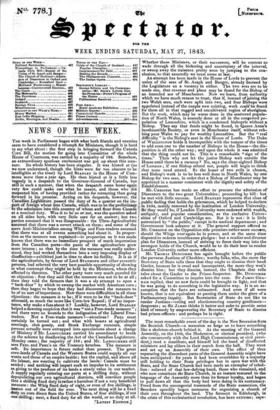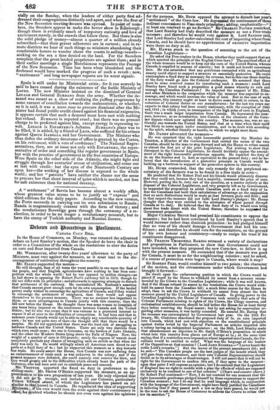The most remarkable event of the day is the New
Secession from the Scottish Church—a secession so large as to leave something like a skeleton-church behind it. At the meeting of the General Assembly, on the 18th, the Moderator, or clerical president, (who sits concurrently with the Lord High Commissioner, or civil presi- dent,) read a manifesto, and himself led the band of disaffected ministers and lay elders in their march from the hall. They went and set up an Assembly of their own. The effect of thus separating the discordant parts of the General Assembly might have been anticipated : for years it had been overridden by a majority still holding to their State privileges but in open war with the State, and the State Church had been made an exemplar of rebel- lion : relieved of that law-defying band, those who remained, and who now constitute the State Church, in an instant restored to the language of the Assembly more than its former loyalty, and began to pull down all that the body had been doing in its contumacy. Freed from the uncongenial trammels of the State connexion, the Seceders speedily began measures for organizing a church of their own throughout the land. The ferment in Edinburgh, in the crisis of this ecclesiastical revolution, has been extreme; espe-
dally on the Sunday, when the leaders of either party first ad- dressed their congregations distinctly and apart, and when the first of the New Secession meeting-houses was opened. In point of num- bers, the Seceders appear to make the better show in Edinburgh ; though there is evidently much of temporary curiosity and love of excitement merely, in the crowds that follow them. But there is also the solid pledge of money—almost a quarter of a million already subscribed—that their graver adherents are in earnest ; and in re- mote districts we hear of such things as ministers abandoning their comfortable homes to wander about the coasts in sailing-vessels- seeking on the sea a fane denied on the land. For the Seceders complain that the great landed proprietors are against them ; and in their earlier meetings a single Marchioness represents the Peerage of the New Secession. Time has been when bloodshed and the firebrand would have marked the progress of such a revolt : now, " excitement " and long newspaper reports are its worst signals.



























 Previous page
Previous page